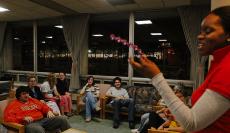McKinley offers safe sex seminars

November 15, 2006
At the time, it seems like a small decision.
Many college students find themselves in situations of escalating passion or with the need to satisfy their carnal desires while with their partners. In these moments, it is difficult to stop the momentum with a question that could potentially bring down the mood. Yet, asking a partner to use a condom may not seem so awkward considering the probability of contracting an STI, sexually transmitted infection, or STD, a sexually transmitted disease.
The term STI is relatively new and it is different from STDs because an infection can be passed with no symptoms and is easier to treat, while STDs are infections that have symptoms and are more difficult to treat, according to Planned Parenthood.
In the United States, 15.3 million new cases of STDs and STIs are reported to the U.S. Department of Health and Human Services each year. These cases are more common among young adults than any other group, resulting from sex with multiple partners and more frequent unprotected sex.
According to the American Social Health Association, nine million of these cases occur with young people ages 15 to 24. In fact, young people have a 50 percent chance of contracting an infection before they turn 25.
Get The Daily Illini in your inbox!
Different organizations make attempts to lower these numbers by raising awareness among young people. McKinley Health Center offers several informative seminars including their, “What’s hot, what’s not” program, held in Garner Hall on Nov. 9, where students learn more about how to have a healthy sex life. The program goes through the levels of risk for different sexual acts. It also shows how to properly apply a condom and introduces a variety of sex toys.
Last week, Karli Oxnevad, junior in Business and resident advisor of Garner hall arranged the “What’s hot, what’s not” program to present for the residents.
“My friend did the same thing and it had a pretty good turn out,” she said. “It’s for alternatives to sex; it’s more educational than just a sex toy party.”
The program was presented by Kim Williams, graduate assistant in the health education unit at McKinley, and more than 20 people came to the presentation, many of whom were resident advisors. Most of the audience consisted of young women who, according to the American Social Health Association, are more likely to contract chlamydia and gonorrhea because of changes in the cervix during puberty. They may also suffer more complications from STDs or STIs.
The audience had a hard time refraining from joking and giggling due to the nature of the content.
“It’s only irritating if someone laughs at someone else’s questions,” Williams said. “People come from different backgrounds, so you don’t know what they’ve been exposed to. I always say there are no stupid questions.”
Maggie Moerschbaecher, freshman in Engineering and Shelly Gareiss, freshman in LAS, are roommates at Garner Hall. They volunteered during the presentation not knowing that their task would be to show the audience how to properly apply a condom.
“I was intimated at first. It was awkward doing it in front of a lot of people, but it was fun,” Gareiss said. “This (presentation) was good because it seems like it would be embarrassing to go to, but it was a friendly atmosphere.”
Despite the giggling from the audience, Williams said she thinks McKinley should still provide these programs for students.
“I would rather teach safe alternatives then teaching abstinence only,” she said.






